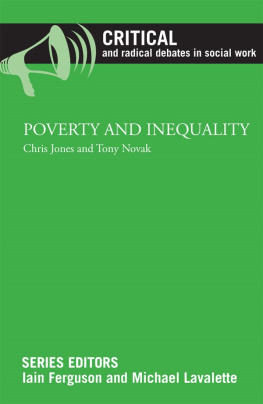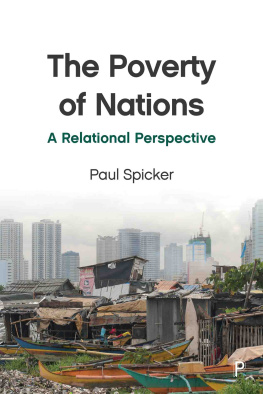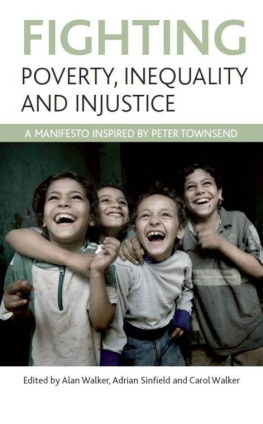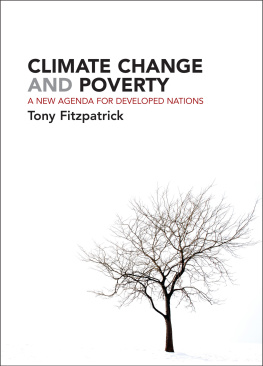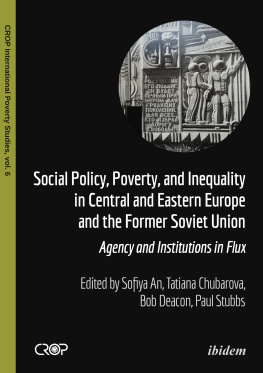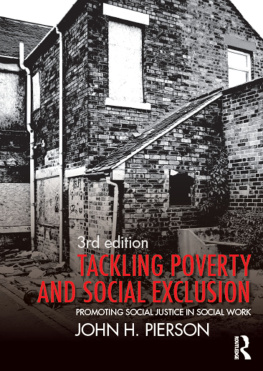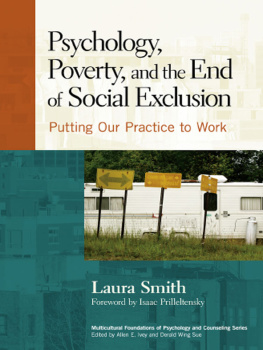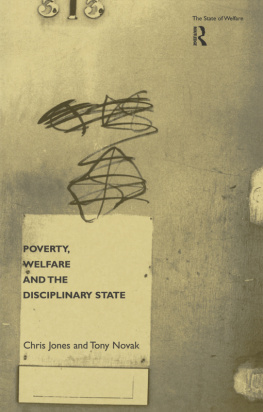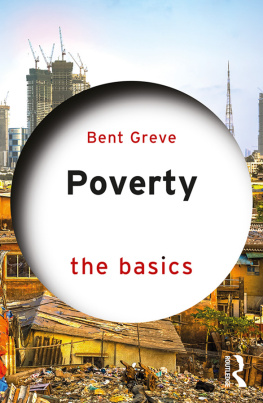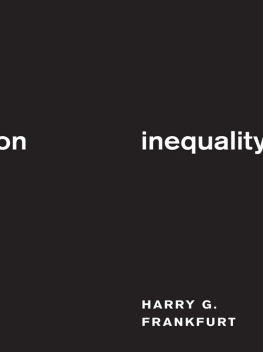POVERTY AND INEQUALITY
Chris Jones and Tony Novak,
with responses from Mimi Abramovitz, Suzanne Dudziak, Dimitra-Dora Teloni and Sanford F. Schram
SERIES EDITORS:
Iain Ferguson and Michael Lavalette

First published in Great Britain in 2013 by
Policy Press
University of Bristol
6th Floor
Howard House
Queens Avenue
Bristol BS8 1SD
UK
t: +44 (0)117 331 5020
f: +44 (0)117 331 5367
www.policypress.co.uk
North American office:
Policy Press
c/o The University of Chicago Press
1427 East 60th Street
Chicago, IL 60637, USA
t: +1 773 702 7700
f: +1 773-702-9756
www.press.uchicago.edu
Policy Press 2013
ISBN 978 1 44731 591 9 Kindle
ISBN 978 1 44731 590 2 epub
British Library Cataloguing in Publication Data
A catalogue record for this book is available from the British Library.
Library of Congress Cataloging-in-Publication Data
A catalog record for this book has been requested.
The right of Chris Jones and Tony Novak to be identified as authors of this work has been asserted by them in accordance with the Copyright, Designs and Patents Act 1988.
All rights reserved: no part of this publication may be reproduced, stored in a retrieval system, or transmitted in any form or by any means, electronic, mechanical, photocopying, recording, or otherwise without the prior permission of Policy Press.
The statements and opinions contained within this publication are solely those of the contributors and not of the University of Bristol or Policy Press. The University of Bristol and Policy Press disclaim responsibility for any injury to persons or property resulting from any material published in this publication.
Every effort has been made to trace copyright holders and to obtain their permission for the use of copyright material. The publisher apologises for any errors or omissions in the text and would be grateful if notified of any corrections that should be incorporated in future reprints or editions of this book.
Policy Press works to counter discrimination on grounds of gender, race, disability, age and sexuality.
Cover design Policy Press
OTHER TITLES AVAILABLE IN THIS SERIES
PERSONALISATION by Peter Beresford
ADULT SOCIAL CARE by Iain Ferguson and Michael Lavalette
MENTAL HEALTH by Jeremy Weinstein
ETHICS by Sarah Banks
CHILDREN AND FAMILIES by Paul Michael Garrett
for more information about this series visit: www.policypress.co.uk/crdsw.asp
Policy Press also publishes the journal Critical and Radical Social Work , for more information visit: http://www.policypress.co.uk/journals_crsw.asp
Contents
Lead authors
Chris Jones is Adjunct Professor of Social Work at Liverpool Hope University. He has published widely on aspects of social work, social work education and the demonisation of the poor by the state.
Tony Novak was formally a lecturer in social work and social policy at the Universities of Bradford and Liverpool. He has written widely on poverty, inequality and state brutality.
Respondents
Mimi Abramovitz is the Bertha Capen Reynolds Professor of Social Policy at Silberman School of Social Work at Hunter College and The CUNY Graduate Center, US. A scholar and an activist, she writes extensively about women, poverty, the economy and US social welfare policy. She is the author of Regulating the lives of women: social welfare policy from colonial times to the present , the award-winning Under attack, fighting back: women and welfare in the US , and co-author of The dynamics of social welfare policy and Taxes are a womens issue: reframing the debate . Dr Abramovitz is currently writing Gender obligations: the history of low-income womens activism since 1900 and researching the impact of privatisation on the delivery of human services in New York City
Suzanne Dudziak , BA, MSW, PhD, is Associate Professor of Social Work at St Thomas University, New Brunswick, Canada. She writes and publishes on various aspects of social work and social movements internationally.
Dimitra-Dora Teloni teaches social work in the Technological Institution of Patras, Greece. Her research interests cover poverty and social work, community work, anti-racist social work and the link between social work and social movements. She is involved in the local Social Work Action Network in Patras/Greece.
Professor Sanford F. Schram , PhD, teaches courses on American politics, political economy, social welfare policy, social theory, and research methodology at Bryn Mawr College, where he has been co-director of the Center on Ethnicities, Communities, and Social Policy. His books include Words of welfare: the poverty of social science and the social science of poverty (1995), which won APSAs Michael Harrington Book Award, and three subsequent books on social welfare policy.
Series editors
Iain Ferguson is Professor of Social Work and Social Policy at the University of the West of Scotland and a member of the Steering Committee of the Social Work Action Network.
Michael Lavalette is Professor of Social Work and Social Policy at Liverpool Hope University and National Co-ordinator of the Social Work Action Network.
For much of its history, mainstream social work in Britain has been a fairly conservative profession. It has often reflected the dominant political ideologies of the day, while presenting itself as resolutely non-political. Thus, the first social work organisation, the Charity Organisation Society (COS) (1869), rigorously adhered to the Poor Law notion that the poor could be divided into deserving and undeserving, rejected any form of state intervention aimed at improving peoples lives (including free school meals and old-age pensions) and saw the practice of individual casework as the best antidote to the spread of socialist ideas.
By contrast, social work in the 1960s reflected a broad social democratic consensus, evident in the recommendations of the Seebohm Report in England and Wales and the Kilbrandon Report in Scotland on the basis of which the new generic social work departments were established. In most respects, the social work of this period reflected a huge advance on the punitive individualism of the COS (and, it should be said, the punitive individualism of our own time). Even then, however, there was still a tendency to pathologise (albeit it was communities rather than individuals that were seen as failing) and to ignore the extent to which statutory social work intervention continued to be experienced by service users as oppressive and paternalistic. Be that as it may, the progressive possibilities of the new departments were soon cut short by the onset of a global economic crisis in 1973 to which the Labour governments of the time could offer no answer, except cuts and belt-tightening.
What is also true, however, as we have argued elsewhere (Lavalette and Ferguson, 2007), is that there has always been another tradition in social work, an activist/radical approach which has sought to present an alternative vision both to individualism and also to paternalist, top-down collectivism. This approach, which flourished in the UK in the 1970s, located the problems experienced by those who sought social work support in the material conditions of their lives and attempted to develop practice responses that challenged these conditions and their effects.
One source of theory underpinning that approach was the excellent series Critical Texts in Social Work and the Welfare State, edited by Peter Leonard and published by Macmillan.
Three decades on, this current series aims to similarly deepen and refresh the critical and radical social work tradition by providing a range of critical perspectives on key issues in contemporary social work. Social work has always been a contested profession but the need for a space for debate and discussion around ways forward for those committed to a social work practice informed by notions of social justice has never been greater. The issues are complex. How should social workers view personalisation, for example? In an era of austerity, can social work be about more than simply safeguarding and rationing scarce services? Will the integration of services in areas such as mental health lead to improved services or simply greater domination of medical models? Do social work practices offer an escape from managerialism and bureaucracy or are they simply a Trojan horse for privatisation?
Next page
